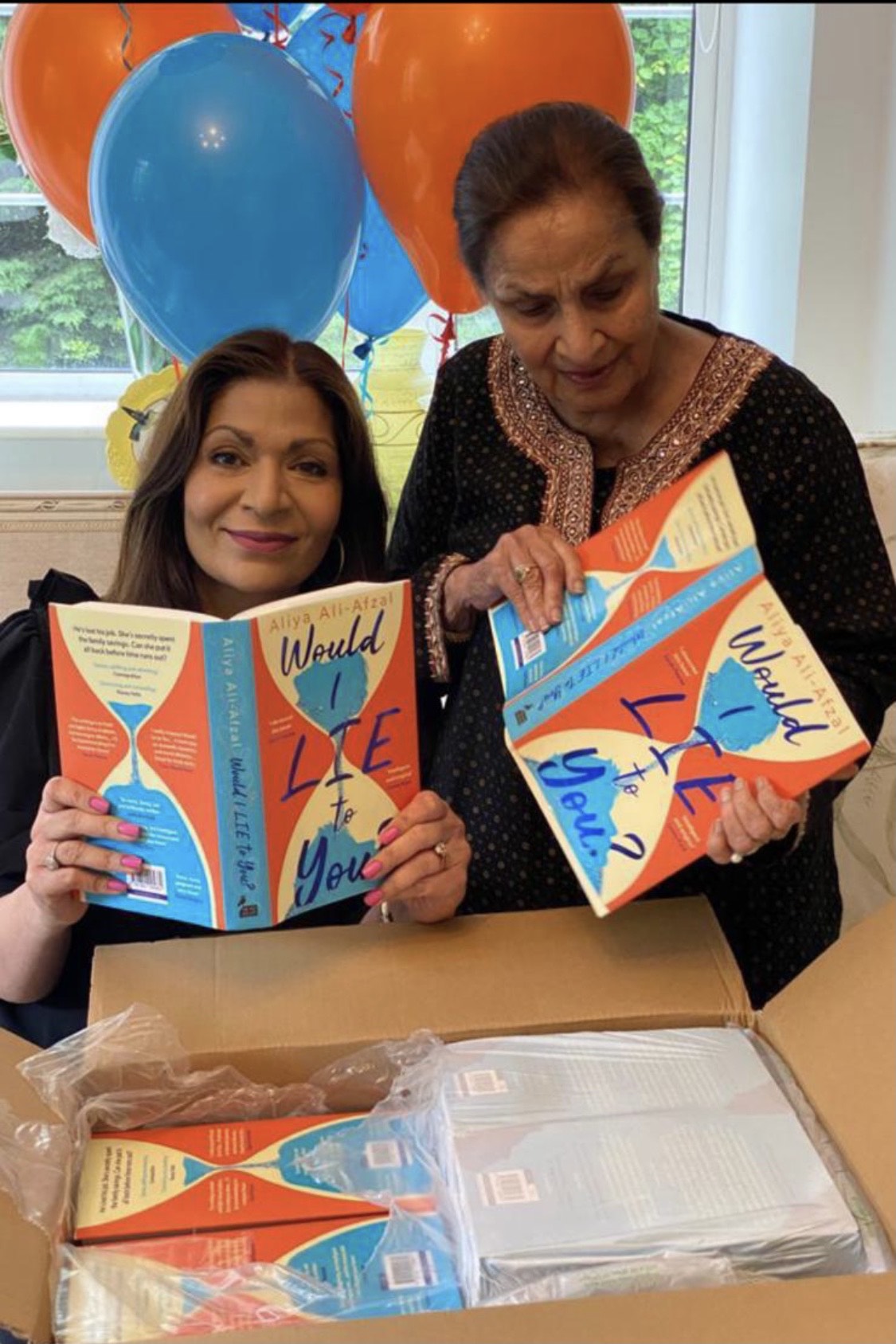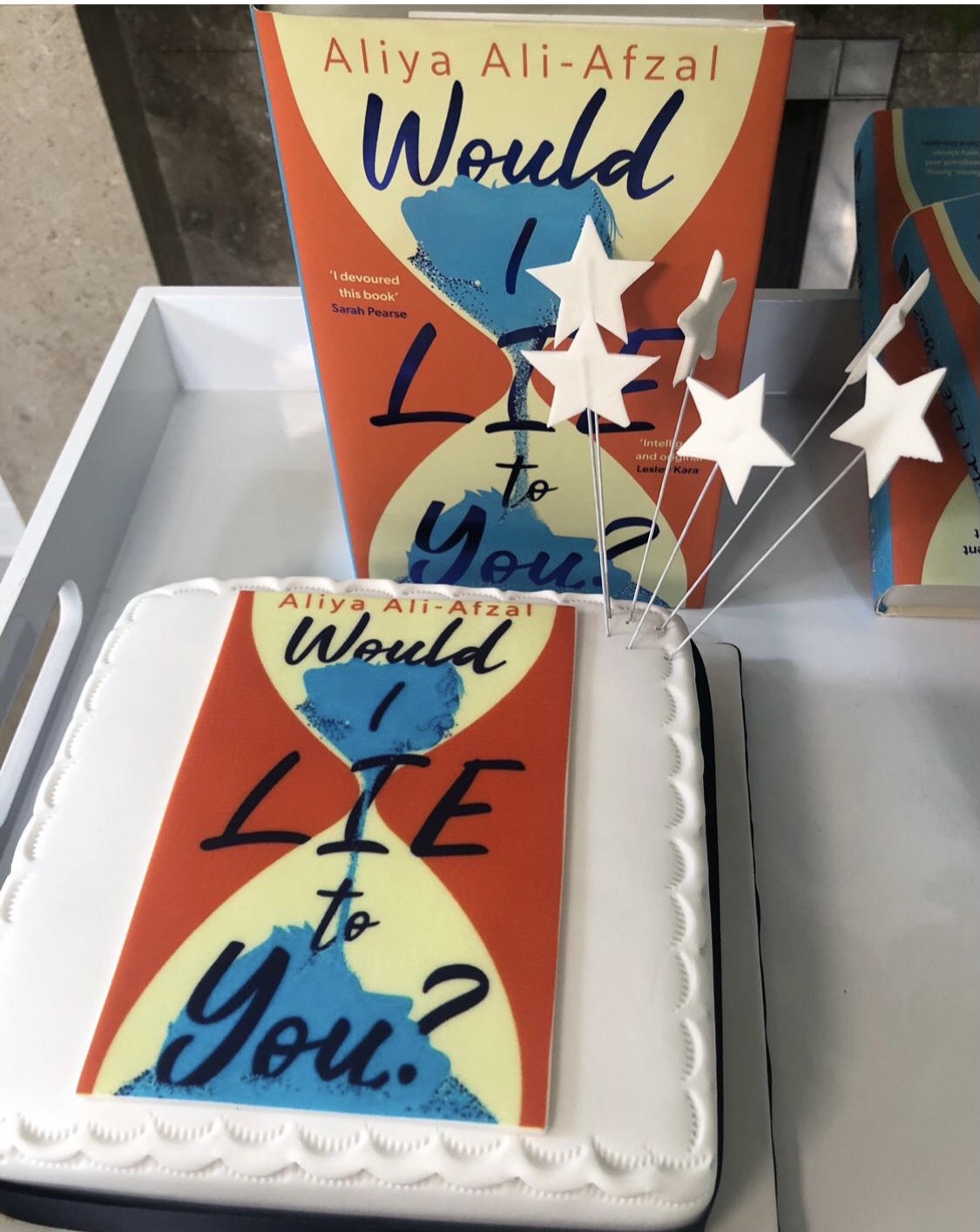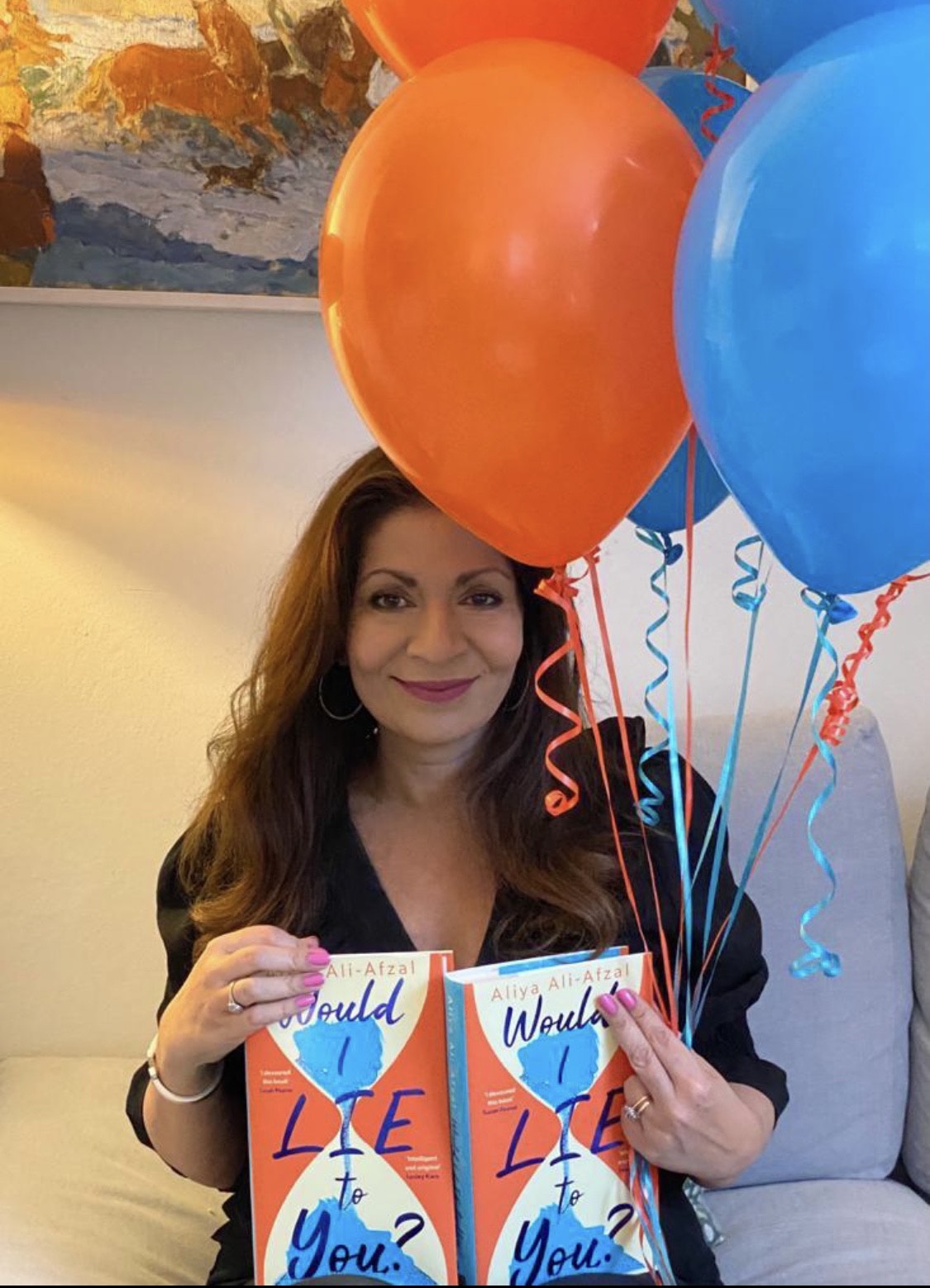Our debut author of the month is Aliya Ali-Afzal, her gorgeous debut novel Would I Lie To You? is a wonderfully thought-provoking mix of themes and genres. You can certainly read it expecting a feel-good hit, but not before thoughts and feelings experience a thoroughly good shake-up. Aliya herself describes it as: “a cross between Big Little Lies and Such a Fun Age and was inspired by my own experience, of my husband I having completely opposite approaches to money (spender vs saver!)”. Aliya’s journey to being an author is a fascinating one. She has a degree in Russian and German, is an Executive MBA career and life coach for business schools in London, and the novel was written as she did an MA in Creative Writing during her 40’s. Her answers are as interesting as I expected and what fabulous photos, thank you Aliya!
Aliya says: "Please come and say hello on Twitter @AAAiswriting and on Instagram @aliyaaliafzalauthor to find out more about my life/ family/ writing juggle and my adventures in the beautiful city of London, where I’ve lived all my life since moving here as a young child from Pakistan. You can also follow me on Amazon to get latest updates and offers… I hope you enjoy reading Would I Lie To You? and it helps you to escape into another world for a while!”.
Aliya also featured in the LoveReading LitFest and you can see a 'taster' of her exclusive iterview by clicking here
Tell us about the first book that really caught your imagination and you fell in love with.
It has to be Jane Eyre, which I read when I was 12. It still remains my favourite book. Now that I think about it, Jane Eyre has the same sort of mixture that I love in my novels: mystery, suspense, relationships, and most of all, a woman discovering who she is and living authentically. I was so inspired by Jane’s courage and resilience and was so interested in her journey as she finds her power. It was such a page turner but was a comforting and inspirational book to read at 12 and is the same today, in my 50s!
When did you first start to write, and when did you decide to write a novel?
Writing has always been ‘my thing’. My mother still has poems and stories I wrote when I was six or seven and when I was 11 I remember my English teacher telling me that I wrote very well and I should think about becoming a writer. I never considered writing a novel or pursuing it as a professional option. I didn’t know any writers and it seemed like too much of a fantasy and something other people did. I did a degree in Russian and German and after spending some time at home with my young children, I became a City headhunter and then an Executive MBA career coach, which is what I’ve been working as for the last twenty years. I never stopped writing though.

I wrote short stories for my children, poems as birthday presents. When I was in my late forties, I heard about 2 old university friends who were writing novels. I still remember hearing about their writing and knowing immediately that this was what I wanted too. Perhaps I had always wanted it but had been too afraid to go for it. I maybe wanted it too much and so was afraid to even try. I applied for a place on the Curtis Brown Creative novel writing course and when I was selected as one of 15 students out of 250 applicants, I finally got the confidence to start writing ‘seriously’. I thought that if I got selected, maybe my writing was good enough to at least try!
Tell us about your MA and Curtis Brown Creative.
The course changed my life. It was the first time I met a group of people who took their writing seriously and shared the goal of writing a novel. The group became an incredible support network and we still meet up and workshop each other’s work. We also advise on cover letters, submitting to agents, share our experience of publication. Above all though we give each other the encouragement and moral support that only your writers friends can give, because they understand your journey.
My tutors on the course Anna Davis and Nikita Lalwani were the first ones to like my story and my writing and this was an incredible boost. They were also very encouraging.
Another very useful element of the course was that each week, we met a Curtis Brown Literary agent and one of their clients. They told us about their path to publication, their writing practice and it was a rare and exciting opportunity to get this kind of honest insight, which included finding out about the often long and difficult paths to their seemingly overnight appearance on best seller lists. Some of the authors we met included Jojo Moyes, David Nicholls and Rosamund Lupton.

Did the idea for the novel, or Faiza first arrive in your mind, and did the novel go through any major changes from your first thoughts?
The idea came first, which presented itself initially as a question and fascinated me so much that it grew into a novel. Through my work as a career coach, I discovered that many people hide their financial worries and difficulties. They weren’t just hiding this from colleagues or friends but also from those closest to them: partners, parents, close friends, family.
The idea of people carrying this often enormous burden alone started to haunt me. I also began to think how money is still such a taboo topic in society, even though these days we will discuss most intimate detail of our lives quite freely.
I realised that this was caught up in the way we feel about money and the role it plays in our lives. Money is never just about money and we avoid the ‘money talk’ because it is never just about the numbers in our bank statements. It influences how we feel about ourselves and our life choices and about others. It can make us feel safe or insecure, powerful or independent or vulnerable.
Having worked in the City, I was also fascinated by the way anonymous, profit-led corporate decisions about for example job cuts, can filter down to impact the most private and personal aspects of someone’s life.
I also wanted to explore money dynamics within a relationship and I was inspired by my own experience as well for this. My husband and I are polar opposites when it comes to money. I am the spender and he is the saver! This does inevitably cause conflict though thankfully not on the scale we see in Would I Lie To You? I started to think how this kind of opposite approach to finances might snowball if a crisis situation arises, as it does in the book.
As I stated to think about writing a novel about all of this, Faiza presented herself to me! A funny, brave loving mother and wife but who has one big flaw and who hates talking about money.

While the novel is warm and feels like a friend, Faiza goes through some really turbulent times, did you always intend to have a feel-good tone?
I always knew that this book would be driven by suspense. As we follow Faiza on her journey, we have no idea what will happen next and nor does Faiza. Everything is at stake for her and so the tension is high.
My favourite books of all are page turners and I knew that this was a key element in any book I wrote. I had to grip the reader and pull them into Faiza’s world, desperate to find out what will happen next. I have been so thrilled that the most common feedback I’ve had from readers is that they were up until 2am reading the book as they just had to know what happens next!
As the story is about a woman becoming more and more desperate and isolated from her family and friends because of her secret, she does indeed go through some turbulent times and disturbing experiences. This was what I had always planned.

However as Faiza’s character developed we also saw her wry, funny take on life and the way she uses humour as a coping strategy. Her love for her family, and their love for her and her fierce desire to protect the people she loves were other elements that provided the ‘feel good’ and warm tone to the book.
This was never by design, unlike the more suspenseful elements of the plot, which was my original idea. The humour and family bonds grew organically. I’m thrilled that readers have also loved and cared for Faiza, Tom and the other family members and found themselves laughing and crying as well. I love the thought of taking my readers through this whole spectrum of emotions and reading experience!

Tell us about the publishing process, from hearing you had a publishing deal, through to holding a finished copy of the novel in your hand.
In the U.K. there were 3 publishers who wanted to publish my novel and so we ended up in an auction. Once my agent Juliet Mushens and I had decided to choose Head of Zeus, it was incredible to see the announcement in the Bookseller! My agent told me that my novel had been pre-empted by Grand Central Publishing in the US while I was on the phone on hold, waiting to speak to the GP. I remember switching calls to speak to my agent and accepting the amazing publishing deal, then trying to chat casually to the GP!

Once I had signed with Head of Zeus I worked with my editor for several months of edits, copy edits and proof reads. In the middle of that, some unexpected yet very exciting things started to happen; a book cover, a blurb, my novel up for sale on the Waterstones website, gorgeous proof copies looking like a real book sent out to incredible authors, asking them to read the book and hopefully review it. The book starts to become this other, independent entity.

Then the hardbacks get printed. I was thrilled to get an incredible collection of quotes from several Sunday Times best selling authors and was overwhelmed at this kindness in reading the book and overjoyed that they liked it!

On publication day, as we couldn’t have a book launch, I did a mini tour of local bookshops and the most wonderful moment was to see my book on a shelf in a bookshop! When I heard that 3 copies had already been sold that morning, I jumped up in the air!

What one thing do you wish you had known before starting your novel?
I wish I had allowed myself to write my book without worrying about how much of my time and energy it took, when I had so many family and work commitments that I had to cut down on, to be able to write. My guilt about pursuing this path to write a novel was huge, especially when the odds of getting published are so low. I wish I knew that it is OK to pursue a dream like this, and that I don’t need to feel guilty about devoting my time to something I love so much.

What piece of advice would you give to anyone thinking about writing a book?
The first thing is to stay focused on writing the book and not worry about finding and agent or whether you will get published.

Finding an agent is hard and publication is never certain but that’s should not be your main goal when you’re writing. If you want to write and have a story to tell, that’s all you need to think about! The best way to get published is to not think about it as you write!

The other thing that really helped me was joining a writing group. As I described earlier, my writing friends have been my lifeline and writing and getting published has been easier, less lonely and a lot more fun, with their support. You can find groups online as well and often, though not always, these can be people you met on a writing course as I did.

Have you had any surprises in the feedback from readers?
I have been delighted at the love and support readers have shown Faiza. She is a flawed character and although I loved her, I was worried that readers may judge her too harshly. I’m so happy to hear readers say they root for her throughout the book and was overwhelmed to hear three book bloggers whom I admire greatly, tell me that Faiza is one of their all times favourite fictional heroines.
I’ve also been pleasantly surprised by the response to the different kind of British Asian narrative that I have shown in the novel, which I’ve drawn from my own experience of my family and friends, but never saw in fiction. The stories that we usually see of more traditional British-Asian households and those about culture clash and racism are accurate too, but it is only one part of that culture and we never saw any other narratives.
Faiza and her parents are not stereotypes. She happily straddles two cultures, she’s funny and feisty and her parents and her community are very happy with her being in an interracial marriage with Tom, who is white.

British Asian readers have got in touch again and again to tell me how wonderful it is to see themselves accurately represented and to see us in an upbeat, mainstream commercial fiction novel, and a brown female lead grappling with universal themes. Although Faiza does experience micro aggressions due to her identity and her heritage does impact the story, it is not the story itself, which is about a woman spending too much money and lying about it.
White readers have been connecting equally to the themes of lies in relationships and have also found this British-Asian narrative fascinating, as it is rare to see it in fiction, and also found the instances of micro aggressions thought-provoking and insightful. I love the way there is such a wide readership for the book, across ethnicities but also ages and from all over the country.

What is next?
My deal was a 2 books so I’m writing the next book now! It feels surreal and yet also very natural to be writing full time and knowing that this is what I call my job now.
My US publication is in February 2022, so I am now starting to do some publicity for that and also excited to see my US cover.

If you enjoyed this, take a look at our other 'Author Talk' blog posts.



Comments (0)
Leave A Reply
You must be logged in to post a comment.